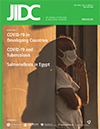A practical approach for the compassionate use of convalescent plasma in patients with severe COVID-19 in developing countries
DOI:
https://doi.org/10.3855/jidc.12827Keywords:
coronavirus, COVID-19, developing countries, plasmapheresis, convalescent plasmaAbstract
The COVID-19 pandemic has affected 187 countries, representing a global public health problem. The increasing number of critically ill patients and deaths have fueled a desperate search for treatments that can halt the course of the disease. Currently, there are several experimental therapies with demonstrated in vitro activity against COVID-19 used in clinical practice, including hydroxychloroquine, remdesivir, interleukin-6 pathway inhibitors, and convalescent plasma; however, to date no agent has proven efficacy against COVID-19. In the case of convalescent plasma, this therapy consists in obtaining neutralizing antibodies from previously infected individuals by plasmapheresis and administering them to patients with severe disease. Recently, the use of convalescent plasma has shown promising results in preliminary studies, with case series reporting a decrease in temperature, and viral load, as well as improvement in clinical parameters among patients receiving this treatment. However, there are still unmet needs regarding the safety profile, tolerability, dosage, and timing this therapy should be given. Based on this, the objective of our study was to develop and propose a practical approach for the compassionate use of convalescent plasma for the treatment of patients with severe COVID-19, given the constrains and limitations of developing countries. We encourage health professionals in developing countries to use the current evidence and approaches to experimental treatments for patients with COVID-19, adapting them to their conditions, and always based on a thorough risk-benefit evaluation for each patient, and whenever possible to design and promote the much needed research in this field.
Downloads
Published
How to Cite
Issue
Section
License
Authors who publish with this journal agree to the following terms:
- Authors retain copyright and grant the journal right of first publication with the work simultaneously licensed under a Creative Commons Attribution License that allows others to share the work with an acknowledgement of the work's authorship and initial publication in this journal.
- Authors are able to enter into separate, additional contractual arrangements for the non-exclusive distribution of the journal's published version of the work (e.g., post it to an institutional repository or publish it in a book), with an acknowledgement of its initial publication in this journal.
- Authors are permitted and encouraged to post their work online (e.g., in institutional repositories or on their website) prior to and during the submission process, as it can lead to productive exchanges, as well as earlier and greater citation of published work (See The Effect of Open Access).








